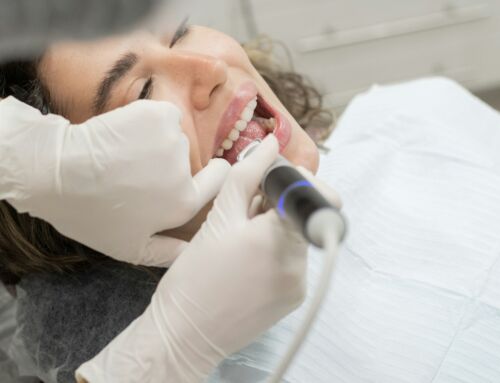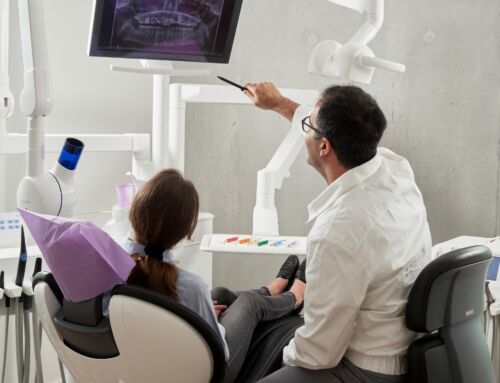Dental implants help restore smiles and improve confidence. However, after undergoing the procedure, some individuals experience gum pain. Understanding this pain is essential to managing it effectively so you can fully enjoy your new smile.
Dental implants work by fusing with the jawbone, a process that can naturally cause discomfort during the healing phase. As the gums adjust to the new addition, they may become sensitive. Everyone heals differently, and sometimes there might be some swelling or irritation. Fortunately, once the causes of gum pain are understood, managing it becomes much easier. This temporary discomfort leads to a positive outcome, providing a healthier, brighter smile for years to come.
Why Gum Pain Occurs After Getting Dental Implants
So, why do gums become sore after dental implants? The body sees any foreign object, even a beneficial one like an implant, as something new to adapt to. Here are a few reasons gum pain might occur:
– Healing Process: After surgery, the gums and surrounding bone need time to heal. Like any other part of your body, post-surgery gums can be tender and sensitive. This stage is perfectly normal, as the tissues are actively recovering.
– Bone Adaptation: Implants fuse directly with the jawbone, a process known as osseointegration. This natural adjustment can cause initial discomfort as your body begins to adapt.
– Swelling and Sensitivity: Swelling is part of the body’s healing response. With the increased activity in the gum area due to surgery, they might feel more tender than usual. Sensitivity to hot or cold temperatures may temporarily increase as well.
Understanding these factors helps in recognizing that this pain, while uncomfortable, is a typical part of the healing process. It’s a reminder that, while the area is healing, everything is progressing as it should. Keeping an eye on pain levels and knowing when something feels off is crucial, and there are various ways to manage these temporary annoyances effectively.
Managing Gum Pain After Dental Implants
Getting through the initial days after receiving dental implants can be challenging, but several strategies can help reduce discomfort and promote healing. Always follow the aftercare instructions provided by your dentist, as they’re essential for recovery.
Here are some practical tips to manage gum pain effectively:
– Cold Compresses: Applying an ice pack or cold compress to the affected area can help reduce swelling and numb the pain. Use it for about 15 minutes at a time, with breaks to avoid skin irritation.
– Medication: Your dentist might prescribe or recommend over-the-counter pain relievers. Take these as directed to manage discomfort effectively.
– Maintain a Soft Diet: Stick to soft foods like mashed potatoes, yogurt, and soups. Avoid hot, spicy, or hard foods that can irritate your gums further.
It’s also helpful to stay hydrated and avoid using straws, as the sucking action can disturb the implant area. By adhering to these measures, you’re giving your gums the best chance to heal comfortably.
When to Consult Your Dentist
While some level of discomfort post-surgery is common, knowing when to seek your dentist’s advice can prevent minor issues from escalating. Persistent pain or swelling that doesn’t improve may be a cue to make that call.
If you notice unusual signs, such as prolonged bleeding, sharp pain that doesn’t subside, or signs of infection like pus or a fever, it’s important to contact your dentist promptly. Regular check-ups are vital for recovery, ensuring that your implant is integrating well with your jawbone and everything is functioning properly.
Potential complications, although uncommon, should be caught early for the best outcome. A professional opinion will help determine whether your healing is normal or if more intervention is needed.
Ensuring Proper Healing and Long-Term Gum Health
Once the immediate post-surgery phase passes, maintaining your implants and ensuring long-term gum health become the focus. Good oral hygiene is essential to keep your implants in optimal condition. Brushing twice a day and flossing gently around the implant area will help prevent plaque build-up.
Consider these practices for ongoing maintenance:
– Schedule regular dental check-ups to track your implant’s progress.
– Use an antibacterial mouthwash to reduce infection risk.
– Avoid smoking, as it can hinder healing and affect oral health overall.
Even after healing, following these practices ensures your implants remain a healthy, permanent solution for your dental needs.
Achieving Comfort and Confidence With Dental Implants
Getting dental implants can transform your smile, enhancing your appearance and self-confidence. By understanding and managing gum pain effectively, you set yourself up for success in experiencing all the benefits these innovations bring. It’s all about patience, attentive care, and seeking help when needed.
Remember, professional advice is invaluable whenever persistent issues arise. Embrace your path towards a radiant smile in Alderley Edge, and look forward to sharing it with the world.
For those looking to enhance their smile with dental implants in Alderley Edge, The Croft Dental & Implant Practice offers expert care and guidance. To learn more about the process and how to maintain your oral health, trust our experienced team to help you achieve a confident new look.






